SOUTH ASIA
home > projects > south-asia
Good Shepherd School, Hyderabad, India, 2011
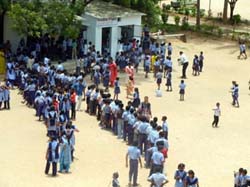
Photo shows the children lining up for their first daily serving.
Approximately 500 children are receiving a daily serving of soymilk from the SoyCow ‘E” system installed there in early 2011. This is one of several SoyCow and VitaGoat projects in various regions of India sponsored by Hands of Compassion, a Canadian-based humanitarian organisation.
Plenty Food Project Seniors Residence Ahmedabad, India, 2011
Together with the Jain group “Divine Knowledge Society” Plenty Food, an NGO based in the Netherlands, has co-sponsored two SoyCow “M” systems in India.
This one was installed at a Jain seniors’ residence near a village just outside of Ahmedabad. From there milk will also be delivered as a donation to local schools.
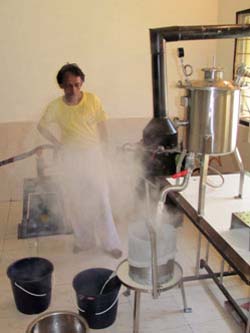
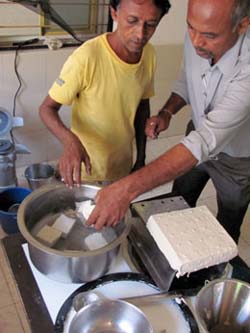
Worker making a batch of soymilk and local supervisor helping make tofu (soy paneer)
Delhi Jaitpur Project (2009)
This enterprise is a cooperative of bi-vocational workers who need to subsidize their income in order to be able to carry out their social work in the community. The machine is currently being run by three men and overseen by Bobby Fudenna of the NGO Jesus Gives Ministries. Their primary consumers are children in local schools run by NGOs, for underprivileged children. The enterprise subsidize this outreach by selling a percentage of their produce to local schools as well as community people interested in the health benefits of the soy milk products. The production workers have learned some important lessons about the critical value of adding flavour. The team is entrepreneurial, adaptive and innovative enough to be able to expand their customer base by providing soy food products that are indigenous to the tastes of Delhiites. They are currently supplying (inexpensively flavoured) strawberry flavour milk to a school in Delhi. They also discovered that by calling the soy milk India Power Milk, they avoided the comparisons between Soy milk and Cow's milk.
The VitaGoat for this project was co-funded by Jesus Gives Ministries (USA) and the World Bank Development Marketplace.
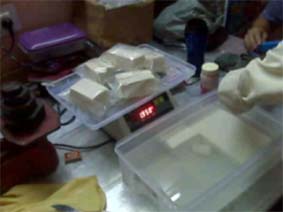
Workers packaging Tofu

Production worker preparing to deliver to a potentila customer
Punjabi Project (2009) Operated by Dusty Sandals
The Punjabi culture is remarkably different than that of Delhi and the residents are much more open to the use of Soy foods. Charanjit (director of Dusty Sandals Vitagoat project) was very excited to name the product Punjabi Power Milk and the name inspired pride among the locals when I mentioned it. Dusty Sandals has a high quality production area. It was built specifically for the VitaGoats and has a large dry area, a clean production area, chimney vents, plumbing and a sink area. There are two machines set up to serve the high demand for the soy milk products. Charanjit uses the machines to supply local schools and orphanages as well as commercial markets. There is a big demand here for health food supplements and the Soy milk is marketed to the young men who are eager for food supplements to help them with body building, a popular past time in Punjab. Dusty Sandals plans uses the profits from this venture to subsidize their school, which has a student body of 200 children with plenty of space for expansion.
The two VitaGoats for this project was co-funded by Dusty Sandals (Alberta, Canada) and the World Bank Development Marketplace.
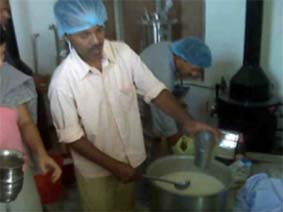
Fresh Punjabi power milk being served
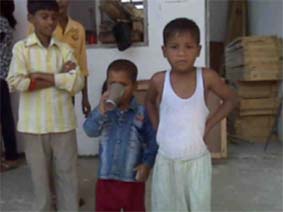
Future bodybuilbers enjoying the soymilk
Malnutrition Matters BISWA Soymilk Project in Orissa
Funded by the World Bank Development Marketplace

This project, funded in 2007 by the World Bank, has supplied 15 VitaGoat systems, as well as one field-trial fruit and vegetable dryer, deployed in rural villages, run primarily by women's self-help groups (SHGs). The first 8 VitaGoats were installed in rural Orissa, near Sambalpur. 75% of the capital cost of this equipment was financed with 'mini-credit' from the micro-finance arm of BISWA, the local partner NGO in the proposal. Each VitaGoat is providing part of a midday meal for 700-800 students.
Soymilk produced with the VitaGoats, fortified by additional micro-nutrients, provides nutrition supplementation to 6,000 poor children in rural and village schools. The project was developed over a two-year period, ending in December 2009. With a very modest government subsidy (midday-meal program) for the soymilk delivered by bicycle to the schools, the projects are run on a sustainable basis by women's self help groups (SHG's) in micro-enterprises that provide employment and income to the workers.
The project is a major extension of the earlier pilot program in Orissa, India, supported by Child Haven International, with funding by Donner Canadian Foundation.
Seven other VitaGoat systems have been installed with other partners in India, including Seva Mandir (Udaipur, Rajasthan) and Dusty Sandals (Punjab). The total number of continuing beneficiaries of this project is over 8,000.
Child Haven International Donner Canadian Foundation
VitaGoat Project - India
Malnutrition Matters, with sponsorship from Child Haven International and funding from the Donner Foundation Canada, is continuing a multi-phase project begun in India in 2005, which started with a technology transfer and several VitaGoat pilot sites.
Project Overview: The technology transfer for manufacturing of the VitaGoat was completed in late 2005. Since then, over 100 systems have been manufactured and shipped by SSP Unit 5 (formerly G.D. Machines) in India, including 20 systems installed in India. The placement of the three VitaGoat pilot systems is as follows: one at the Adhyatma Sadhna Kendra Ashram in Delhi, the second in the rural village of Antapali in Orissa, via the NGO Bharat Integrated Social Welfare Agency (BISWA). The third VitaGoat is being installed in August 2007 in the village of Banki (near Cuttack in Orissa), in cooperation with the NGO BAAHKP. The second phase of the project in India, funded by Donner Foundation Canada, under the auspices of Child Haven International, saw the installation of 2 more VitaGoats: one with Naandi Foundation in Hyderabad and one in the Mae La Oon refugee camp in Thailand. The second phase also succeeded in facilitating the technology transfer of the SolarFlex Fruit and Vegetable Dryer to SSP in India. The third phase, now underway, has seen the installation of one VitaGoat system in Patna, Bihar and one in the Mae Sot refugee camp in Thailand. The third and final system will be installed early in 2010.
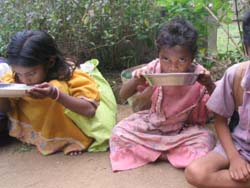
School children in rural Orissa drinking soymilk from their lunch plates.
The first VitaGoat installed in Orissa, in the village of Antapali is owned by several women's Self-Help Groups, and is being supervised by BISWA, a dynamic NGO with a substantial presence in Orissa and neighbouring states. BISWA has helped to ensure that the VitaGoat is providing midday meals for more than 700 school children on a self-sustaining basis, with revenue from government-funded school feeding programs. This VitaGoat is the first to be involved in school feeding programs for primary school children in areas where there is widespread malnutrition and no available electricity. Eight additional VitaGoats have since been added to this program, as part of the World Bank Development Marketplace project, and over 6,000 children are now receiving soymilk as supplementary nutrition.
Small-scale Soy Industry in India:
Dr. Ratan Sharma, a soyfoods expert living in Delhi, has been assisting Child Haven with value-added soy projects since the early 90's. Dr. Sharma has been instrumental in promoting and expanding the small-scale soy industry in India. Dr. Sharma's continued assistance with the VitaGoat program will do much to ensure the acceptance of this micro-enterprise system within federal and state government vocational and entrepreneurial programs, as well as within the private sector.
The small-scale soy industry in India is growing by over 100% per year. There are currently about 200 small-scale systems installed throughout India, including training installations in several federal and state-sponsored entrepreneurial programs. Great promise for the VitaGoat exists in rural India where electricity is often not available, due to lack of service entirely, or due to increasingly lengthy blackouts. Therefore, there is great potential for the VitaGoat to both piggyback on the growing success of the existing small-scale soy processing enterprises, as well as to expand into the village and rural areas to both produce soymilk and process other local fruits and vegetables. There is also a growing market for soymilk and other derivative soy products in small and large cities; the new electric model SoyCow is ideal for these environments where electricity is reliably available and more efficient production is cost-effective.
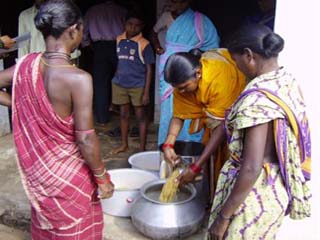
Self-Help Group members in the village of Bousenmura in Orissa, measuring soaked soybeans before cooking
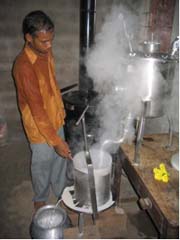
VitaGoat expert Monrajnan releasing soymilk in Anatpali, Orissa
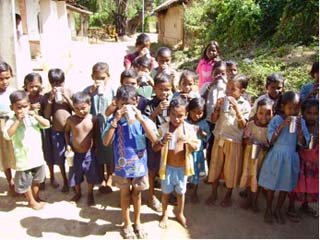
Children in Bousenmura, Orissa happily get their first taste of soymilk
Stay Up to Date
Questions?
Request more information from matters@malnutrition.org
© 2025 Malnutrition.org | Malnutrition Matters. All Rights Reserved.
